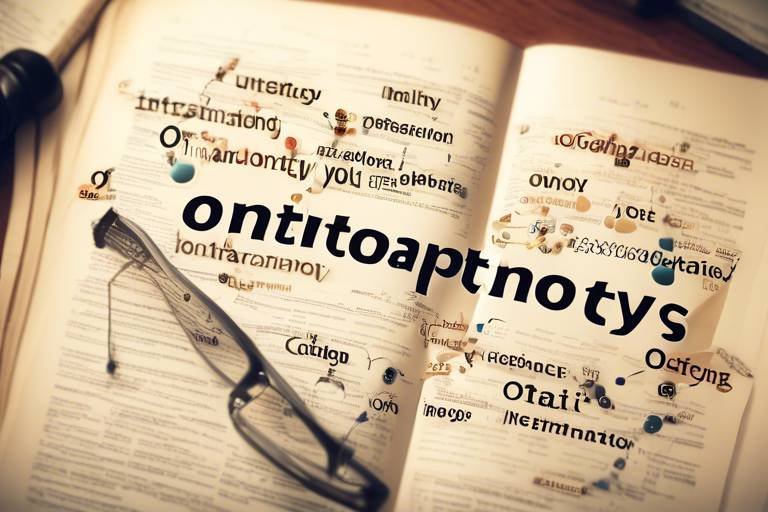The Practicality of Ontology in Political Philosophy
In the intricate world of political philosophy, the concept of ontology emerges as a vital pillar, shaping our understanding of power, identity, and governance. But what exactly does ontology mean in this context? At its core, ontology is the study of being and existence, a philosophical endeavor that delves into the very nature of reality. It provides a foundational framework that allows us to dissect and analyze political concepts, revealing the underlying assumptions that often go unnoticed in political discourse.
Imagine trying to navigate a vast, complex city without a map. You might know your destination, but without a clear understanding of the streets, neighborhoods, and landmarks, you would likely get lost. Similarly, ontology serves as our map in the political landscape, guiding us through the convoluted paths of political theory and practice. By clarifying the fundamental questions of existence—what it means to be a citizen, what constitutes power, and how identities shape our political realities—ontology enables us to engage more meaningfully with contemporary political issues.
As we explore the significance of ontology in political philosophy, we uncover how it influences our perceptions of governance and social order. For instance, consider how different societies interpret the notion of authority. In some cultures, authority is rooted in tradition and collective identity, while in others, it may stem from individual rights and democratic principles. Here, ontology acts as a lens, allowing us to see how these varying interpretations shape political behavior and institutional structures.
Furthermore, the practicality of ontology extends beyond mere theoretical exploration. It has real-world implications that affect governance and policy-making. By understanding the ontological underpinnings of political ideologies, policymakers can craft strategies that resonate with the identities and values of their constituents. This alignment is crucial for fostering social cohesion and ensuring that governance reflects the diverse tapestry of identities present in society.
In summary, the practicality of ontology in political philosophy cannot be overstated. It not only enriches our understanding of political concepts but also equips us with the tools necessary to navigate the complexities of power and identity in contemporary society. As we delve deeper into this article, we will further explore how ontology shapes our perceptions of identity and power dynamics, providing a comprehensive view of its role in political philosophy.
- What is ontology in political philosophy?
Ontology in political philosophy refers to the study of being and existence, focusing on the fundamental nature of political concepts and the assumptions that underlie them.
- How does identity influence politics?
Identity influences politics by shaping individuals' beliefs, behaviors, and affiliations, which in turn affect decision-making processes and political movements.
- Why is understanding power dynamics important?
Understanding power dynamics is crucial as it helps us analyze how power is distributed and exercised within society, influencing governance and social relations.

Understanding Ontology
Ontology, at its core, is the philosophical study of being and existence. It delves into the very essence of what it means to be, providing a foundational framework that can be applied across various disciplines, including political philosophy. By examining the fundamental nature of reality, ontology helps us clarify the underlying assumptions that shape political theories and practices. Think of it as the lens through which we view the political landscape; without this lens, our understanding would be blurred and incomplete. Just as an architect needs a blueprint to construct a building, political theorists require ontological frameworks to build coherent and comprehensive theories.
In the realm of political philosophy, ontology becomes a powerful tool. It allows us to dissect and analyze concepts such as power, identity, and governance. For instance, when we talk about **power**, we must consider what we mean by it—does it stem from authority, influence, or structure? Similarly, when discussing **identity**, we need to ask ourselves: what constitutes an identity in a political context? Is it based on nationality, culture, or personal beliefs? These questions lead us deeper into the intricate web of political ontology, where the interplay of various elements creates a complex tapestry of human interaction.
Moreover, ontology encourages us to question the status quo. It invites us to challenge the assumptions we often take for granted. For example, many political systems operate under the belief that power is a zero-sum game—where one group's gain is another's loss. However, an ontological perspective might prompt us to explore alternative models of power distribution, such as cooperative governance, where power is shared and distributed more equitably. This shift in thinking can have profound implications for how we conceptualize and implement political systems.
In summary, understanding ontology is not just an academic exercise; it's a vital aspect of comprehending the political world around us. By engaging with ontological questions, we can better understand the dynamics of power and identity that shape our societies. This understanding can lead to more informed and effective governance, ultimately enhancing our collective ability to navigate the complexities of contemporary political life.

The Role of Identity in Politics
When we talk about politics, one of the most intriguing aspects that comes into play is identity. It's fascinating to consider how our identities shape not just our personal beliefs but also the broader political landscape. Identity is like a prism through which we view the world, influencing our interactions and decisions. Think about it: have you ever found yourself drawn to a political movement simply because it resonated with your personal experiences or beliefs? This connection between identity and politics is profound and multifaceted.
In the realm of political ontology, identity plays a pivotal role in determining how individuals and groups engage with political processes. For instance, collective identities—those shared attributes and beliefs that bind groups together—can significantly impact political movements. When people come together under a shared identity, they often find strength in numbers, amplifying their voices and pushing for change. This phenomenon can be observed in various contexts, from civil rights movements to social justice initiatives, where collective identity fosters a sense of unity and purpose.
Moreover, national identity is another crucial element in the political sphere. It shapes how citizens perceive their government and their responsibilities towards it. For example, individuals who identify strongly with their nation may feel a greater obligation to participate in civic duties such as voting or community service. This sense of belonging can also influence their views on national policies, immigration, and foreign relations. It's as if national identity serves as a lens, coloring how we interpret political events and decisions.
On the flip side, cultural identity also plays a significant role in shaping political affiliations and ideologies. Our cultural backgrounds inform our values, beliefs, and, ultimately, our political choices. For instance, individuals from diverse cultural backgrounds may have different perspectives on issues like healthcare, education, and social equity. This diversity can enrich political discourse, but it can also lead to polarization if not managed thoughtfully. Understanding the cultural dimensions of identity can help us appreciate the complexities of political engagement.
Lastly, we must not overlook the impact of individual identity. Each person's unique experiences and beliefs contribute to their political attitudes and actions. Whether it's a personal struggle with inequality or a passionate belief in environmental conservation, these individual narratives shape the broader political dialogue. It's essential to recognize that while collective and cultural identities are significant, the personal stories that individuals carry are equally important in understanding political behavior.
In summary, the role of identity in politics is intricate and dynamic. It influences how we engage with political systems and the ways in which we advocate for change. By exploring the various dimensions of identity—collective, national, cultural, and individual—we can gain a deeper understanding of the political landscape and the forces that drive it.
- How does collective identity influence political movements?
Collective identity fosters unity among group members, enabling them to mobilize effectively for shared goals, amplifying their voices in the political arena. - What is the significance of national identity in politics?
National identity shapes citizens' perceptions of their government and can enhance civic engagement, influencing attitudes toward policies and national responsibilities. - How does cultural identity affect political beliefs?
Cultural identity informs values and beliefs, leading to diverse perspectives on political issues, which can enrich political discourse but also create divisions. - Why is individual identity important in political engagement?
Individual experiences and beliefs play a crucial role in shaping political attitudes, highlighting the personal narratives that contribute to the larger political conversation.

Collective Identity
Collective identity is a fascinating concept that encapsulates the shared attributes, beliefs, and experiences of a group. Imagine a tapestry woven from countless threads, each representing an individual’s story, yet together they create a vibrant picture of unity and purpose. In the realm of politics, collective identity serves as a powerful catalyst for social movements and political engagement. It is not merely about belonging; it’s about the **shared narrative** that binds individuals together, driving them towards common goals. This is particularly evident in movements where collective identity fosters a sense of solidarity among members, enabling them to challenge the status quo.
One of the most striking features of collective identity is its ability to mobilize individuals. When people see themselves as part of a larger group—be it based on ethnicity, religion, or political ideology—they are often more inclined to participate in political activities. This sense of belonging can transform passive individuals into active agents of change. For instance, consider the impact of the Civil Rights Movement in the United States during the 1960s. The collective identity formed among African Americans, rooted in shared experiences of oppression and a common vision for equality, galvanized a nation into action.
Furthermore, collective identity plays a pivotal role in shaping political discourse. It influences how groups articulate their demands and negotiate their positions within the political landscape. By framing issues through the lens of collective identity, groups can effectively communicate their needs and aspirations, making them more resonant with broader audiences. This is evident in various social movements today, where hashtags and slogans often encapsulate the essence of collective identity, rallying support and amplifying their messages across social media platforms.
However, while collective identity can be a source of strength, it can also lead to division. The same attributes that unite a group can also create **exclusionary boundaries**. For instance, when a collective identity becomes too rigid, it can alienate those who do not fit neatly into its parameters. This phenomenon can result in **in-group versus out-group** dynamics, where the emphasis on collective identity overshadows the importance of individual experiences and diversity within the group. Thus, the challenge lies in balancing the power of collective identity with the need for inclusivity, ensuring that it serves as a unifying force rather than a divisive one.
In essence, collective identity is a double-edged sword in the political arena. It can inspire and mobilize, but it can also create barriers. Understanding this complexity is crucial for political philosophers and activists alike, as they navigate the intricate dance of identity, power, and governance. By recognizing the nuances of collective identity, we can better appreciate its role in shaping political landscapes and fostering social change.
- What is collective identity? Collective identity refers to the shared characteristics and beliefs that unite a group of individuals, influencing their political behavior and engagement.
- How does collective identity impact social movements? Collective identity can mobilize individuals by fostering a sense of belonging, driving them to participate actively in political activities and advocate for change.
- Can collective identity be divisive? Yes, while it can unite, a rigid collective identity can also create exclusionary boundaries, alienating those who do not conform to its norms.

National Identity
National identity is a powerful force that shapes not only how individuals perceive themselves but also how they relate to the state and each other. It’s like the glue that binds a community together, creating a shared sense of belonging and purpose. Think of it as a cultural tapestry woven from the threads of history, language, and tradition, each contributing to a collective narrative that influences political behavior. When citizens identify strongly with their nation, it can lead to a robust sense of loyalty and patriotism, which in turn affects their engagement with political processes.
However, the implications of national identity are complex and multifaceted. On one hand, it can foster unity and social cohesion, rallying people around common goals and values. On the other hand, it can also create divisions, particularly when the definition of national identity becomes exclusionary. For instance, consider the following aspects:
- Shared History: National identity often hinges on a collective memory of historical events, whether they be triumphs or tragedies. This shared history can influence contemporary political narratives and policies.
- Language and Culture: The language spoken and cultural practices observed can serve as markers of national identity, impacting how citizens perceive their nation and its governance.
- Symbols and Traditions: National symbols, such as flags and anthems, play a significant role in reinforcing national identity. They evoke feelings of pride and belonging, especially during national celebrations.
Moreover, national identity is not static; it evolves over time, influenced by globalization, migration, and changing demographics. As societies become more diverse, the challenge lies in balancing a cohesive national identity with the recognition of multiple identities within the population. This can lead to a richer, more inclusive understanding of what it means to belong to a nation, but it also raises questions about representation and equity in governance.
In essence, national identity shapes citizens' perceptions of governance in profound ways. It affects how they view political leaders, policies, and the legitimacy of the state itself. When citizens feel that their national identity is respected and reflected in governmental actions, they are more likely to engage positively with the political system. Conversely, if they perceive a disconnect between their identity and the state's actions, it can lead to disillusionment and disengagement.
As we navigate the complexities of national identity in political philosophy, it becomes clear that understanding this concept is crucial for comprehending the dynamics of power and governance in contemporary society. The interplay between national identity and political behavior is not merely an academic exercise; it has real-world implications for policy-making, social justice, and the overall health of a democracy.
- What is national identity?
National identity refers to the sense of belonging to a specific nation, shaped by shared history, culture, language, and values. - How does national identity influence political behavior?
It affects how individuals engage with the political system, their loyalty to the state, and their perceptions of governance. - Can national identity change over time?
Yes, it evolves due to factors like globalization, migration, and shifts in cultural demographics. - What role do symbols play in national identity?
Symbols such as flags and anthems evoke feelings of pride and belonging, reinforcing national identity among citizens.

Cultural Identity
Cultural identity is a fascinating and intricate aspect of political ontology that plays a pivotal role in shaping our political affiliations and ideologies. It is not just a label; it is the essence of who we are and how we relate to the world around us. Imagine cultural identity as a tapestry, woven from the threads of language, traditions, beliefs, and shared histories. Each thread contributes to the overall pattern, creating a unique representation of a group’s values and norms. This identity profoundly influences how individuals engage with politics and policy-making.
At its core, cultural identity encompasses various dimensions, including ethnicity, religion, and shared historical experiences. These elements can create a sense of belonging and solidarity among individuals, leading to collective action in the political sphere. For instance, when a group identifies strongly with their cultural heritage, they may mobilize to advocate for policies that protect their traditions and rights. This is evident in movements advocating for indigenous rights, where the preservation of cultural practices is intertwined with political activism.
Moreover, cultural identity can act as a double-edged sword. While it fosters unity and a sense of purpose, it can also lead to division and conflict. When groups perceive their cultural identity as under threat, it can ignite tensions that manifest in political struggles. For example, consider the rise of nationalism in various parts of the world. National identity, often rooted in cultural identity, can lead to exclusionary practices that marginalize those who do not share the same background. This dynamic illustrates how cultural identity can significantly impact governance and societal cohesion.
To better understand the implications of cultural identity on political engagement, let’s explore some key aspects:
- Political Mobilization: Cultural identity often serves as a rallying point for groups seeking political representation. This mobilization can lead to increased voter turnout and advocacy for specific issues.
- Policy Influence: Policymakers must consider cultural identity when crafting legislation. Ignoring these identities can result in policies that alienate certain groups, leading to social unrest.
- Intergroup Relations: The interplay between different cultural identities can create alliances or exacerbate tensions. Understanding these dynamics is crucial for fostering inclusive governance.
In essence, cultural identity is not merely a backdrop to political action; it is a driving force that shapes the landscape of political philosophy. By recognizing the profound impact of cultural identity on political behavior, we can better appreciate the complexities of governance in a multicultural society. As we navigate the challenges of modern politics, acknowledging and respecting diverse cultural identities will be essential for fostering dialogue and achieving social harmony.
- What is cultural identity?
Cultural identity refers to the shared characteristics, beliefs, and values that define a group of people, encompassing aspects like ethnicity, language, and traditions.
- How does cultural identity influence political behavior?
Cultural identity shapes individuals' political affiliations and actions, often leading to collective movements that advocate for specific rights and policies.
- Can cultural identity lead to conflict?
Yes, when groups feel their cultural identity is threatened, it can lead to tensions and conflicts, particularly in politically charged environments.
- What role does cultural identity play in policy-making?
Policymakers must consider cultural identities to create inclusive and effective policies that resonate with diverse populations.

Individual Identity
When we talk about , we’re diving into a world that is as complex as it is fascinating. Each person carries a unique set of experiences, beliefs, and values that shape their perceptions and actions within the political landscape. Think of it like a fingerprint; no two are alike, and each one tells a story. This individuality plays a crucial role in how we engage with politics, influencing everything from voting behavior to activism.
For instance, consider how personal experiences—such as socioeconomic status, education, and cultural background—can significantly impact a person's political views. Someone who has faced economic hardship might prioritize policies that address wealth inequality, while another who has benefited from a privileged background may focus on issues like tax cuts. These differences highlight the importance of understanding individual identity in political discussions.
Moreover, the concept of individual identity is not static; it evolves over time. As people encounter new experiences or shift their social circles, their political beliefs can also change. This dynamic nature of identity means that political parties and movements must continuously adapt to resonate with diverse groups of individuals. For instance, the rise of social media has allowed for more personalized political discourse, where individuals can express their views and find like-minded communities, further shaping their political identity.
In the grand tapestry of political philosophy, individual identity acts as a thread that connects personal beliefs to larger societal movements. It’s not just about who we are as individuals; it’s about how those identities interact with collective narratives. When we understand that each person's identity can influence their political actions, we begin to see the importance of representation in governance. If a political system fails to acknowledge the diverse identities within its populace, it risks alienating significant segments of society.
To illustrate this point further, let’s look at a few key factors that contribute to individual identity in politics:
- Personal Experiences: Life events that shape one's worldview.
- Social Environment: The influence of family, friends, and community.
- Education: The role of knowledge and critical thinking in shaping beliefs.
- Media Consumption: The impact of news and social media on political opinions.
Understanding these factors can lead to more inclusive political strategies that resonate with a broader audience. In conclusion, individual identity is not merely a personal characteristic; it’s a vital component of political ontology that shapes how we engage with the world around us. As we continue to explore the intersection of identity and politics, we must recognize the profound impact that our individual experiences have on the collective political landscape.
- What is the significance of individual identity in politics? Individual identity influences political beliefs and behaviors, shaping how people engage with political issues and movements.
- How can understanding individual identity improve political strategies? By recognizing the diverse identities within a population, political strategies can be tailored to resonate with different groups, fostering inclusivity.
- What factors contribute to the formation of individual identity? Key factors include personal experiences, social environment, education, and media consumption.

Power Dynamics in Political Ontology
Power is not just a buzzword in political philosophy; it’s a central theme that influences everything from governance to societal interactions. When we talk about power dynamics in political ontology, we’re diving deep into the very fabric of how power operates and is perceived within various contexts. It’s like peeling back the layers of an onion—each layer reveals a new aspect of how power shapes and is shaped by our existence.
At its core, understanding power dynamics through the lens of ontology allows us to question the fundamental assumptions we hold about authority and control. For instance, consider how different societies define power. In some cultures, power may be seen as a top-down structure, where authority is concentrated in a few hands, while in others, it may be viewed as more distributed, with a focus on collective decision-making. This divergence illustrates the importance of ontological perspectives in shaping our understanding of governance and political behavior.
One of the key aspects to explore is the distinction between structural power and relational power. Structural power refers to the systemic forces that create and sustain political outcomes. Think of it as the skeleton of society—it's what holds everything together. These structures can include economic systems, legal frameworks, and institutional norms. They are often invisible yet profoundly influential, shaping the landscape of political possibilities. For example, a country with a robust legal system may have different power dynamics compared to one where laws are arbitrary and inconsistently applied.
On the other hand, relational power focuses on the interactions between individuals and groups. It’s the dance of politics, where influence is exerted through relationships, negotiations, and social networks. This type of power is often more fluid and can change rapidly based on context and circumstances. For instance, grassroots movements can challenge established power structures by leveraging relational power, demonstrating that even the most entrenched systems can be disrupted by collective action. Here, ontology plays a crucial role in helping us understand how these interactions manifest and what they mean for political engagement.
To illustrate these concepts further, let’s consider a table that summarizes the key differences between structural and relational power:
| Aspect | Structural Power | Relational Power |
|---|---|---|
| Definition | Systemic forces shaping outcomes | Influence exerted through relationships |
| Nature | Static and often invisible | Dynamic and visible |
| Example | Legal frameworks | Grassroots movements |
In conclusion, the interplay between structural and relational power within the framework of political ontology opens up a rich tapestry of understanding that is essential for grasping the complexities of governance and social interaction. By examining these dynamics, we can better appreciate how power operates in our lives and the significant role that our identities and relationships play in shaping political realities.
- What is ontology in political philosophy?
Ontology in political philosophy refers to the study of existence and being, particularly how these concepts relate to political structures and theories. - How does identity influence political behavior?
Identity shapes political behavior by informing individuals' beliefs, values, and affiliations, which can impact decision-making processes. - What are the two types of power dynamics?
The two main types of power dynamics discussed are structural power, which is systemic and often invisible, and relational power, which is dynamic and based on interactions.

Structural Power
Structural power is an intriguing concept in political ontology that delves into the systemic forces shaping political outcomes. Imagine a vast web, where each strand represents a different element of society—economics, culture, institutions, and more. These strands intertwine to create a complex structure that influences how power is distributed and exercised. Understanding structural power is crucial because it goes beyond individual actions or decisions; it looks at the broader context in which those actions take place. This perspective allows us to see how certain groups or institutions maintain dominance, while others struggle to gain a foothold in the political arena.
At its core, structural power can be understood through various lenses, including economic systems, institutional frameworks, and cultural norms. Each of these components plays a significant role in shaping political realities. For instance, consider how economic inequality can create barriers to political participation. When wealth is concentrated in the hands of a few, their interests often overshadow those of the majority, leading to a skewed political landscape. This scenario illustrates how structural power operates—by embedding inequalities within the very fabric of society, it perpetuates a cycle where the voices of the marginalized are drowned out.
Moreover, institutions themselves can be powerful agents of structural power. Take, for example, the legal system. Laws and regulations are not merely neutral frameworks; they are imbued with the values and interests of those who create them. This means that the legal landscape can either empower or disenfranchise individuals and groups, depending on their socio-economic status or identity. The implications are profound: when laws favor certain demographics, they reinforce existing power structures, making it difficult for others to challenge the status quo.
In addition to economic and institutional factors, cultural norms also play a pivotal role in the dynamics of structural power. Cultural narratives shape our perceptions of authority, legitimacy, and resistance. For instance, in many societies, traditional gender roles can dictate who holds power and who remains subservient. When cultural values prioritize certain identities over others, they contribute to the perpetuation of structural inequalities. Thus, understanding structural power requires a multifaceted approach that considers the interplay of economics, institutions, and culture.
To further illustrate the concept of structural power, consider the following table that outlines key elements and their implications:
| Element | Description | Implications |
|---|---|---|
| Economic Systems | The distribution of resources and wealth in society. | Can create barriers to political participation and influence. |
| Institutions | Established laws, regulations, and organizations. | Can reinforce or challenge existing power dynamics. |
| Cultural Norms | Shared beliefs and values within a society. | Influence perceptions of authority and legitimacy. |
By examining these elements, we can better understand how structural power operates within political systems. It is not merely about who holds power at any given moment; it is about the enduring structures that facilitate or hinder access to that power. This understanding is vital for anyone looking to engage in political activism or reform because it highlights the need to address the root causes of inequality.
In conclusion, structural power is a foundational concept in political ontology that helps us unpack the complexities of governance and societal dynamics. By recognizing the systemic forces at play, we can better navigate the political landscape and advocate for more equitable structures that allow for diverse voices to be heard. After all, a truly democratic society is one where power is not just held by a select few, but is distributed in a way that reflects the diversity and richness of its populace.
- What is structural power? Structural power refers to the systemic forces within society that shape political outcomes, influencing who holds power and how it is exercised.
- How does structural power affect political participation? It creates barriers for marginalized groups, often leading to unequal representation in political processes.
- Why is understanding structural power important? It helps us identify the root causes of inequality and informs strategies for political activism and reform.

Relational Power
When we talk about , we're delving into the intricate web of interactions that exist between individuals and groups within a society. It's not just about who holds the most authority or the biggest title; it's about how people relate to one another and the influence they exert in those relationships. Think of it as a dance where every participant's moves can change the rhythm and flow of the entire performance. In this context, power is not a static entity but a dynamic force that shifts and evolves based on the connections and interactions between people.
Relational power is often shaped by social networks, which can amplify or diminish an individual's influence. For instance, someone deeply embedded in a network of activists might wield significant power in shaping political discourse, even if they lack formal authority. This illustrates how the strength of one’s relationships can impact their political agency. The more connections a person has, the more platforms they have to express their views, mobilize support, and challenge existing power structures.
Moreover, the concept of relational power invites us to consider the contextual factors that influence these interactions. Various elements, such as culture, history, and social norms, play a crucial role in defining how power is exercised and perceived. For example, in some cultures, communal decision-making might empower collective voices, while in others, hierarchies may dominate, stifling individual contributions. Understanding these contexts is essential for grasping how relational power operates in different political environments.
To further illustrate this, let’s look at a few key aspects of relational power:
- Influence of Social Capital: The resources available to an individual or group through their social networks can significantly enhance their political influence.
- Negotiation and Bargaining: Relational power often manifests in negotiations, where individuals leverage their relationships to achieve desired outcomes.
- Collective Action: Groups united by common interests can exert substantial pressure on political systems, demonstrating how relational power can lead to significant social change.
In essence, relational power is about the connections we create and how these connections enable us to navigate the political landscape. It emphasizes the importance of collaboration, dialogue, and mutual understanding in shaping political realities. As we move forward in an increasingly interconnected world, recognizing the significance of relational power can help us foster more inclusive and participatory governance models.
- What is relational power? Relational power refers to the influence that individuals and groups have in political contexts based on their relationships and interactions with others.
- How does relational power differ from structural power? While structural power is about systemic forces and institutions that shape outcomes, relational power focuses on the dynamics between individuals and groups.
- Can relational power lead to social change? Yes, collective action and strong social networks can leverage relational power to challenge existing power structures and drive social change.
Frequently Asked Questions
- What is ontology in the context of political philosophy?
Ontology, in political philosophy, refers to the study of being and existence, which provides a framework for understanding political concepts. It helps us analyze the fundamental assumptions that shape various political theories and practices.
- How does identity influence political behavior?
Identity plays a crucial role in shaping political behavior. Different identities, whether collective or individual, can significantly impact decision-making processes, political affiliations, and engagement in political movements.
- What is collective identity and why is it important?
Collective identity refers to the shared characteristics and beliefs of a group. It is important because it influences social cohesion and can drive political movements, helping groups mobilize around common goals and aspirations.
- How does national identity affect governance?
National identity shapes citizens' perceptions of their government and their relationship with the state. It can foster a sense of belonging and influence how individuals engage with political processes and policies.
- What role does cultural identity play in politics?
Cultural identity influences political affiliations and ideologies. It affects how individuals engage with political issues and can shape policy-making by reflecting the values and norms of different cultural groups.
- In what ways does individual identity impact political attitudes?
Individual identity, shaped by personal experiences and beliefs, can significantly affect one's political attitudes and actions. This means that how we see ourselves influences our views on political issues and our participation in political activities.
- What is structural power in political ontology?
Structural power refers to the systemic forces that shape political outcomes. Understanding these structures through an ontological lens helps us analyze how they influence governance and the distribution of resources and opportunities in society.
- How does relational power differ from structural power?
Relational power focuses on the interactions between individuals and groups, emphasizing the dynamics of power in specific contexts. While structural power looks at broader systems, relational power examines the nuances of interpersonal and group interactions.



















